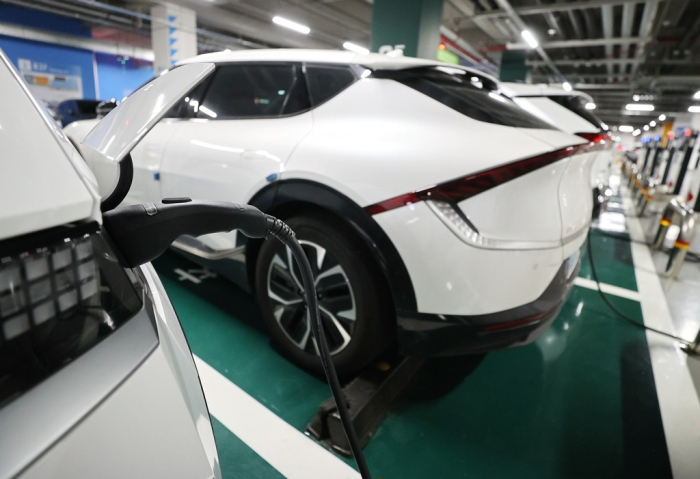Hyundai Motor Group, the world’s third-largest carmaker, has started developing electric vehicle battery technology to cut costs and reduce the use of Chinese precursors to help US EV customers conform to Washington’s requirements for clean car federal tax benefits.
The group said on Thursday its two automaking units -- Hyundai Motor Co. and Kia Corp. -- launched a project to develop lithium iron phosphate (LFP) battery cathodes in collaboration with their affiliate Hyundai Steel Co. and leading domestic cell material manufacturer EcoPro BM Co.
The four companies aim to directly synthesize materials without creating precursors for LFP battery cathode production in the four-year project supported by the South Korean Ministry of Trade, Industry and Energy, according to the country’s No. 3 conglomerate.
“Through this project, we aim to reduce import reliance and enhance the technological competitiveness of the country and Hyundai Motor Group by internalizing necessary technologies,” said Jung Soonjoon, vice president and head of the electrification and driving materials development group for Hyundai Motor Co. and Kia. The group is preparing
to build its first EV battery production lines by around 2027.
Precursors, a core EV battery material, makes up 60-70% of the costs of cathodes. The global precursor market is currently dominated by Chinese companies as the country has many mines and cheap labor.
EV and cell manufacturers have been seeking the material produced in other countries as the US deems certain battery materials procured from foreign entities of concern (FEOCs) -- notably businesses significantly influenced by China -- as ineligible for federal subsidies of up to $7,500 per vehicle.
Other South Korean companies such as LG Chem Ltd. have started manufacturing precursors.
Hyundai Motor Co. and Kia are together the No. 2 EV player in the US, the world’s third-largest eco-friendly vehicle market after Tesla Inc.
MORE ECO-FRIENDLY, COST-COMPETITIVECathodes for LFP batteries are currently produced by adding lithium to precursor materials such as phosphate and iron sulfate.
Hyundai Motor Group and EcoPro BM are set to develop a direct synthesis process that simultaneously adds phosphate, iron powder and lithium without creating a separate precursor. Through the new manufacturing technology, they aim to develop LFP battery cathodes with fast-charging features and better charging and discharging performance at low temperatures.
The technology is more eco-friendly and cost-competitive than the existing production process as it eliminates the precursor production step and reduces the emissions of hazardous substances during manufacturing, the group said.
The technology requires impurity-free and uniformly sized raw materials.
Hyundai Motor Co., Kia and
Hyundai Steel will jointly develop high-purity fine iron powder processing technology using domestically recycled iron. The technology is set to allow EcoPro BM to work on the directly synthesized LFP battery cathodes.
Write to Jung-Eun Shin and Hyung-Kyu Kim at
newyearis@hankyung.com Jongwoo Cheon edited this article.





